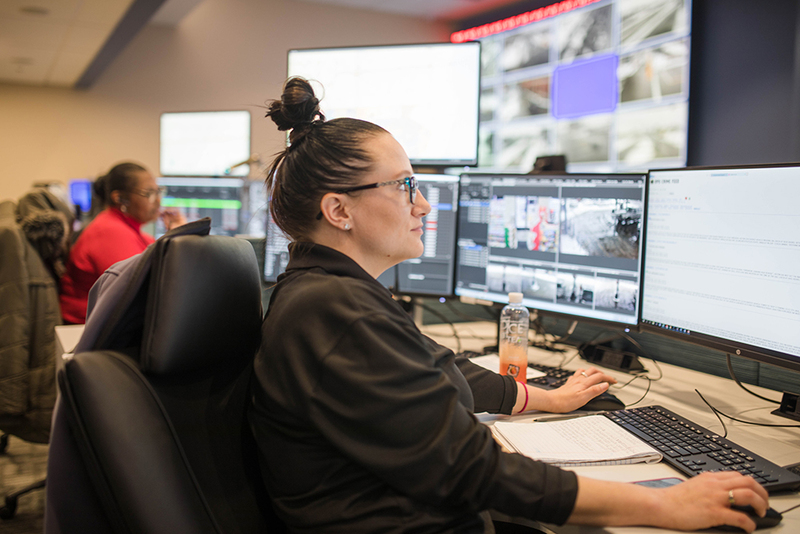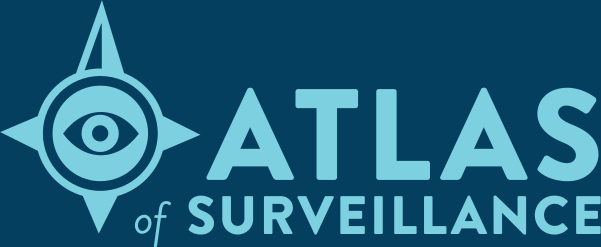Detroit Real-Time Crime Center
Detroit Police Department
Detroit, Michigan

Source: Detroit Police Department
Overview
Housed in the City of Detroit's Public Safety headquarters downtown, the Detroit Police Department's Real-Time Crime Center (RTCC) combines a camera network, face recognition software, automated license plate readers (ALPRs), and a variety of other criminal justice data systems.
Backstory
Detroit's 9,000-square-foot RTCC was launched in 2016 at an initial cost of $8 million, funded by municipal bonds, followed by a $4 million expansion in the summer of 2019, which included the creation of two smaller satellite real-time crime centers. The RTCC is intrinsically linked to DPD's controversial "Project Green Light" video camera and a related facial-recognition program, which was announced in January 2016 as a countermeasure against Detroit’s violent crime problem.
Real-Time Crime Center Operations
Outside the Real-Time Crime Center
One of the signature features of the RTCC is live access to cameras throughout the city: more than 6,000 feeds as of March 2019.
One of the primary sources of video is "Project Green Light," a program that asks businesses to install cameras at an angle where they can capture license plates and accompany them with green-colored light to signal their involvement in the project. As the Detroit Community Technology Project explained in a June 2019 report, the "Project Green Light" program began in 2016 with cameras at eight gas stations and has since grown to a network of more than 550 locations, including schools, churches, and health centers.
Those aren't the only cameras feeding data into the RTCC: As of fall 2019, DPD had installed automated license plate readers at various traffic intersections. This technology involves cameras that photograph license plates, tag with GPS coordinates and time and date, and uploads the information to a searchable database. This allows cops to search the travel patterns of vehicles and even get alerts on a vehicle's location in real-time. In August 2019, the city approved a plan to install an additional 500 video cameras at intersections as part of a "Neighborhood Real-Time Intelligence Program." According to local TV station WXYZ, there are also "secret, hidden cameras" in various areas where illegal dumping is common.
In 2019, the city approved a $4 million expansion of the RTCC program, half of which went to the creation of two 900-square-foot "mini" RTCCs within the 8th and 9th precinct buildings on the west and east sides of the city.
Inside the Real-Time Crime Center
As of 2017, the RTCC had 60 staff members, one-third sworn officers and two-thirds unsworn personnel, but DPD planned to add 21 more "crime analysts, video surveillance analysts and intelligence specialists" as part of the 2019 expansion.
Like many RTCCs around the country, the Detroit RTCC is readily identifiable by the 32-by-9-foot video wall that allows staff to watch footage in real-time. DPD has integrated these video feeds into CommandCentral Aware, a software suite for "real-time video surveillance and data analysis" sold by Motorola Solutions. In addition to a variety of crime and intelligence databases, analysts also monitor social media and news feeds and run background checks on suspects.
The RTCC also provides space for Detroit Public Works employees, who monitor 121 cameras mounted on 787 smart traffic lights that were installed in 2019. The cameras "collect data, such as the volume of vehicles and pedestrians who are going through these intersections," the public works director told The Detroit News.
Probably the most controversial aspect of the RTCC is its use of face recognition software to identify individuals caught on camera using an automated algorithm. DPD contracts with DataWorks Plus, one of the primary vendors providing biometric technology to law enforcement agencies. Similar to fingerprint comparison, facial recognition works by measuring certain elements of a person's face to create a template, which is then compared against other templates culled from an image pool, such as a mugshot database.
Uses and Controversies
DPD’s Real-Time Crime Center monitors camera feeds from public and private camera networks, the latter of which are incorporated into Project Green Light. The project has received criticism from the ACLU, which specifically expressed concerns of constitutionality insofar as “cameras would capture the inside and outside of...common meeting places for many organizations, such as unions, immigrant rights advocates, and religious congregations.”
In light of the Black Lives Matter movement in 2020, protesters in Detroit have called for the abolishment of face recognition, amid reports that innocent people have been misidentified by the technology and police chief James Craig disclosing that the software makes errors “96% of the time.” In January, Robert Williams was arrested at his home in Farmington Hills, accused of stealing watches from Shinola; DPD officers later admitted their computers misidentified him. Another individual, Michael Oliver, was incorrectly charged with felony larceny for an incident in which a man stole a teacher’s cellphone; those charges were also dropped when Oliver’s attorney proved DPD’s computers identified the wrong man. Despite significant critics, the Detroit City Council renewed the face recognition contract in the summer of 2020.
A version of this report appeared in the Aug. 5, 2020 issue of Detroit Metro-Times.
Links
Detroit Free Press: Detroit City Council approves $4 million for Real Time Crime Center
The Detroit News: Detroit ranks as 2nd most violent big city
Detroit Gives Green Light to Real-Time Crime Center Powered by Motorola Solutions
Motorola Solutions: Detroit's $5-million body camera program to be implemented by December
Motorola Solutions: Renewing Hope Through a Safer Motor City (Case Study)
MLive: breakdown of Detroit's $5.2 million police bodycam and dashcam plan
WXYZ: Detroit police open new real time crime center inside DPD Headquarters
ACLU: Detroit Police Are Playing ‘Big Brother’ at Local Businesses
City of Detroit: Detroit Board of Police Commissioners Regular Meeting, March 21, 2019
Muckrock News: Public Records Obtained from the City of Detroit Regarding Dataworks
Motherboard: Police Chief: Facial Recognition Software Misidentifies 96% of the Time
New York Times: Wrongfully Accused by an Algorithm
Last Updated Nov. 13, 2020



